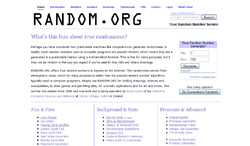Random.org
| Random.org | |
|---|---|
|
| |
|
Random.org as of October, 2009 | |
| Web address | Random.org |
Type of site | Web service |
| Registration | optional |
| Available in | English |
| Owner | Mads Haahr |
| Created by | Mads Haahr |
| Launched | 1998 |
Alexa rank |
|
| Current status | online |
Random.org is a website that produces "true" random numbers based on atmospheric noise.[2] In addition to generating random numbers, it has free tools to simulate events such as flipping coins, shuffling cards, and rolling dice. It also offers paid services to generate sequences of random numbers and act as a third-party arbiter for raffles, sweepstakes, and promotions.
The website was created in 1998 by Mads Haahr,[3][4] a doctor and computer science professor at Trinity College in Dublin, Ireland. Random numbers are generated based on atmospheric noise captured by several radios tuned between stations.[5][6]
Bits
A bit is a number that can equal 0 or 1. There are several Random.org radio listening stations that generate 3,000 bits per second from the atmospheric noise picked up.[7] The generators produce a continual string of bits. An example of a string of bits is: 01100011100000000101010001000001111100010111000101001010... Whenever a random result is requested, the bits are used to generate the result. The simplest instance of a random result on the site is the coin toss. The coin toss requires just one bit at a time. If the bit is 0, the coin would be reverse (tails) and if the bit is 1, the coin would be obverse (heads).
Quota
To make sure nobody places unfair demands on the system a limit to the number of bits supplied to a particular IP address is enforced. Every 24 hours, up to 200,000 bits are added to each IP address' quota. Once the quota has reached 1,000,000 bits, no more will be added. One can buy different amounts of quota top-offs in order to raise their quota, in which case the 1,000,000-bit limit is no longer enforced. The price ranges from between $1 and $5 per million bits.[8]
References
- ↑ "Random.org Site Info". Alexa Internet. Retrieved 2014-04-01.
- ↑ O'Connell, Pamela LiCalzi (2004-04-08). "Lottery Numbers and Books With a Voice". New York Times. Retrieved 2009-10-23.
Other sites also offer true random numbers, said Mads Haahr, lecturer in computer science at Trinity College, Dublin
- ↑ McNichol, Tom (2003-08-11). "Totally Random". Conde Nast Publications. p. 2. Retrieved 2009-10-23.
Mads Haahr, a lecturer in computer science at Trinity College in Dublin, designed the system
- ↑ Klarreich, Erica (2004-12-04). "Take a chance: scientists put randomness to work". Science News. Archived from the original on 2009-10-23.
Haahr's Web site (//www.random.org/) can generate up to 3,000 random numbers per second
- ↑ Johnson, George (2001-06-12). "Connoisseurs of Chaos Offer A Valuable Product: Randomness". New York Times. Retrieved 2009-10-23.
Random.org generates unpredictable sequences of data using a radio tuned between stations, harvesting the atmospheric noise
- ↑ Bialik, Carl (2009-10-14). "How Random Is the iPod's Shuffle?". Wall Street Journal. Retrieved 2009-10-23.
- ↑ http://www.random.org/randomness/
- ↑ "Your Quota". Random.org. Retrieved 2011-10-30.
External links
- Official website
- HTTP client implementations for various programming languages.
